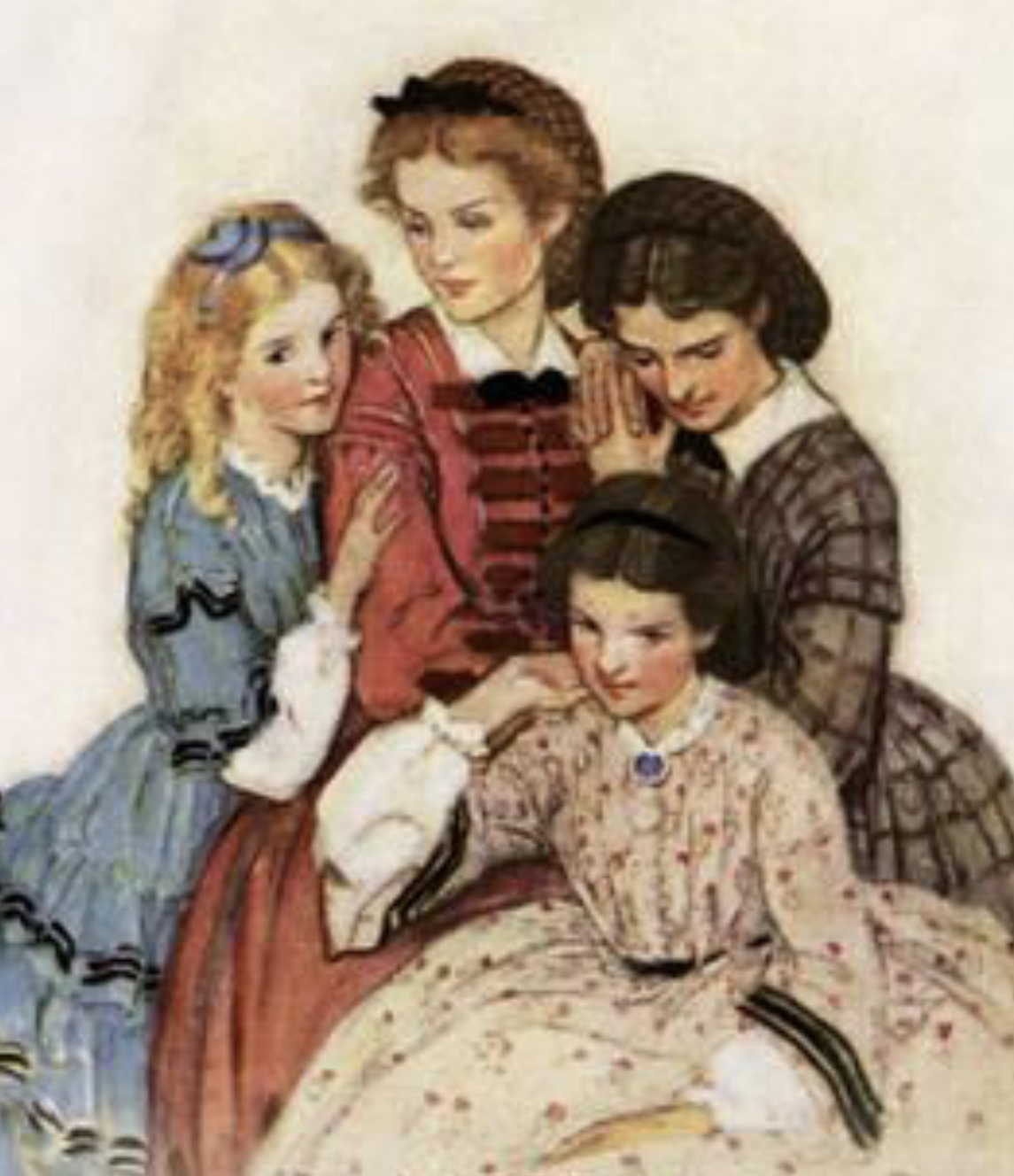Like many young people, the March sisters await and imagine their years to come. Their desires, however, are quite the opposite of who they are to ultimately become, and are unable to fulfill the sisters’ genuine happiness. The little women picture their “castles in the air” and how they are to live out their lives: luxurious and splendid. They are focusing on the appealing material goods of this world and basing their futures on those things. Meg, Jo, and Amy, contrary to their original views, learn that the simple, yet loving lives they grow into have much more value than that of comfortable and extravagant living.
Meg dreams of a “lovely house” and with it, many grand things. She should like to see it well kept and attractive, having “handsome furniture” within. Not only does she want to appear, fashionable but own “heaps of money” as well. Contradictorily, A little while down the road Meg finds herself “too happy to care what anyone … thinks [of her]” and settles into a “little house” as a “poor man’s wife.” Meg trades her hopes for a much different life; a life filled with sacrifices and housekeeping. Nevertheless “They were very happy,” for, despite all the hardships of being poor, the little wife has and loves a caring husband along with precious children. And that is what matters above all, love and real happiness.
Jo, on the other hand, prefers to see life as one of her books, viewing herself as the famous heroine of the tale. Jo fantasizes her life as being “rich and famous” and highly praised due to her superb accomplishments. She goes on in life, discovering that her “castle in the air” is no longer her “favorite dream.” Jo finds much more joy in her life with a poor husband rather than the wealth she once craved. Along with Mr. Bhaer, she lovingly brings up the little men of Plumfield, certainly not the public’s protagonist she daydreamed. Instead, becoming the lads’ hero, the patient “Mother Bhaer.”
Amy aspires to be “the best artist in the whole world,” much like Jo’s wish for fame. Through the course of her life, she also realizes that extra money would be very agreeable as well. It is this desire that leads her to pursue Fred Vaughn’s hand in marriage. Though Amy is not truly in love, Fred is “very rich, – ever so much richer than the Laurences.” Later in her life, she marries the lesser wealthy “Laurence boy” and never fits the title of best artist, yet, she is content with her being. “I’d have married you if you hadn’t a penny … I love you.” And Amy certainly does love her “dearest boy.”
The three March sisters’ “castles in the air” sound very appealing. Nevertheless, they are happier than they ever could conceive with their modest, quiet, loving lives. They want worldly pleasures, things that last but a moment in the long run. The things their imaginary lives are missing is the love, selflessness, and hard work that comes with pure Joy. The real happiness is when you spend your time loving and helping others, Not on selfish little comforts. In her sixtieth year of living a poor, hard-working life, Mrs. March testifies this by her words; “Oh, my girls, however long you may live, I never can wish you a greater happiness than this!” Mrs. March is proud her daughters are experiencing the happiness she has lived for 60 years
Meg, Jo, and Amy are happier in their real lives because they understand that a loving household, serving each other to the fullest, surpasses any title, trophy, or financial status. None of their “castles in the air” give life meaning, they are all about pleasing self-desires. The sisters’ real lives, however, prove to be very fruitful and abundant. Meg finds her happiness in her own family, despite that fact that she is now a hardworking housekeeper. Jo settles in pleasantly with her family and little men. “It never was a fashionable school … [instead] a happy, home-like place for [the] boys.” Amy too found her delight, in helping those less fortunate and served “together [with Laurie] by a love which could tenderly remember those

True Happiness Comes in Serving a Greater Power then Thyself {As Shown in the book “Little Women” by Louisa May Alcott}
March 1, 2018
0 likes
You must be logged in to post a comment.